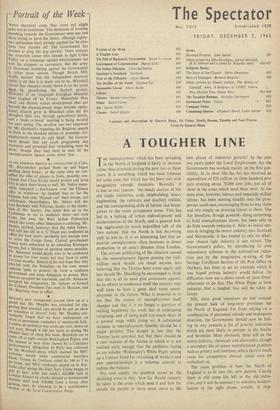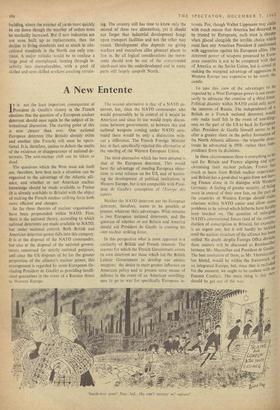A TOUGHER LINE
THE unemployment which has been spreading in the North of England is likely to increase rather than diminish during the next two or three years. It is something which has been foreseen for some time, but which has not been met with imaginative enough measures. - BaSically it is due to two reasons: the steady decline of the old staple industries, coal, shipbuilding, heavy engineering, the railways and (earlier) textiles, and the corresponding drift of labour and brain- power to the more prosperous areas. This has led to a halting of urban redevelopment and modernisation in the North, and a general feel- ing, aggravated by much unjustified talk of the 'two nations' that the North is fast becoming unfit to live in. It is an interesting fact that in- dustrial unemployment often increases in direct proportion to an area's distance from London.
The current publicising of the situation caused by the unemployment figures passing the half- million mark should not tempt anyone into believing that the Thirties have come again; still leas should Mr. Maudling be encouraged to think that this is all he need give assurances against. In its efforts to modernise itself the country may well have to bear a great deal more unem- ployment in the future. What is essential is to see that the nature of unemployment itself changes and that it is no longer a question of waiting hopelessly for work but of undergoing retraining, and of being paid not much short of a normal wage while doing so. A substantial increase in unemployment benefits should be a major priority. The danger is not that the Thirties have returned, but that there should be a new malaise of the Sixties in which it is not realised early enough that the problems facing us are soluble. Wednesday's White Paper setting up a Central Fund for retraining of workers and new apprenticeships is a welcome attempt to redress the balance.
Put very simply, the question raised by the declining areas is this: how far should industry be taken to the areas which need it and how far should the people in those areas move to the
new places of industrial growth? In the past two years under the Local Employment Act the Government has worked mainly on the first pos- sibility. In its short life the Act has involved an expenditure of £70 million on three hundred pro- jects creating about 70,000 new jobs, not all of them in the areas which need them most. At the same time, however, labour, and especially skilled labour, has been moving steadily into the pros- perous south-east, encouraging firms to stay there and rely simply on drawing labour to them. The Act therefore, though probably doing something to hold unemployment down, has been able to do little towards reducing it, After its initial suc- cess in bringing the motor industry into Scotland and Merseyside, it has tended to rely on what- ever chance light industry it can attract. The Government's policy, by introducing its own redundancy schemes in the nationalised indus- tries and by the imaginative re-siting of the Savings Certificate Section of the Post Office in Durham, has been to set an example which it was hoped private industry would follow. Its difficulties now are a direct result of most firms' reluctance to do this. The White Paper at least indicates that a tougher line will be taken in future.
Still, these good intentions do not conceal the present lack of long-term provision for the North of England. Far from relying on a combination of piecemeal subsidy and inadequate direction, the Government should now be feel- ing its way towards a list of priority industries which are most likely to prosper in the Sixties and Seventies. Most obviously these will be the motor industry, chemicals and electronics, though a secondary list of minor manufactured products such as pottery and furniture, where there is much room for competition abroad, could soon be embarked on.
The main problem is how the North of England is to fit into this new pattern. Clearly there is still some life left in the old indus- tries, and it will be necessary to subsidise modern- isation in the right places, notably in ship- building, where the number of yards must quickly be cut down though the number of orders must be markedly increased. But if new industries are not soon built up as replacements, then the decline in living standards and as much in edu- cational standards in the North can only con- tinue. A major mistake would be to confuse a large pool of unemployed, turning through in- activity into unemployables, with a pool of skilled and semi-skilled workers awaiting retrain- ing. The country still has time to know only the second of these two alternatives, yet it should not forget that industrial development hangs upon transport facilities and not the other way round. Development also depends on giving workers and executives alike pleasant places to live in. By all logical considerations the move- ment should now be out of the overcrowded south-east into the underdeveloped and in many parts still largely unspoilt North.







































 Previous page
Previous page